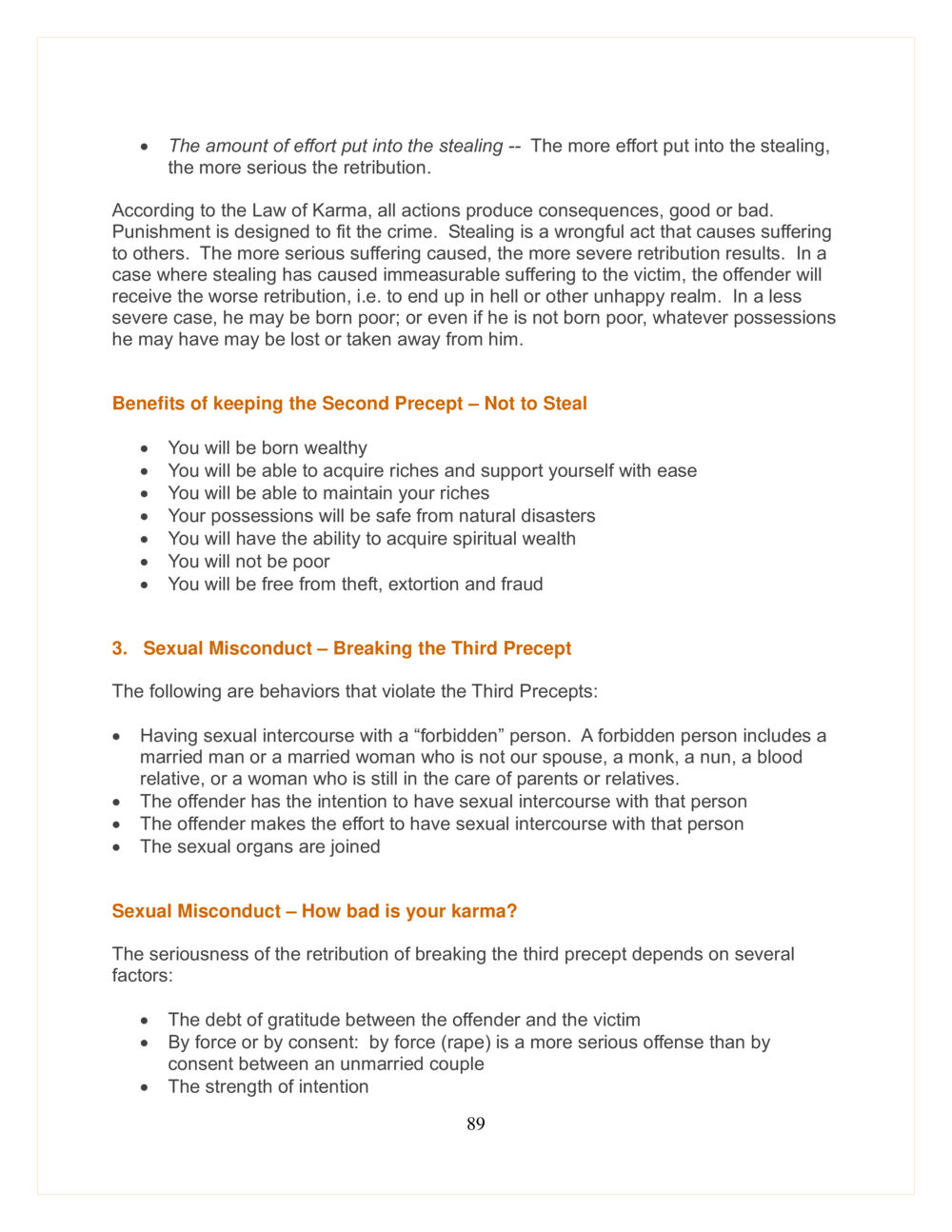Understanding Karma and Retribution for Stealing and Sexual Misconduct : หน้า 89/115
DMC Translor’s handbook : หน้า 89/115 Explore the principles of karma regarding stealing and sexual misconduct, their consequences, and the benefits of adhering to the Second and Third Precepts.
0 ครั้ง

สรุปเนื้อหา
การลงโทษจะต้องตรงกับอาชญากรรม อาชญากรรมการขโมยทำให้เกิดความทุกข์ให้ผู้อื่น ซึ่งการทำผิดที่ทำให้ผู้อื่นเดือดร้อนมากจะมีโทษที่รุนแรงกว่า อย่างเช่น ถ้าขโมยทำให้ผู้ถูกขโมยทุกข์ยากมาก จะถูกลงโทษหนัก เช่น อาจไปตกนรก หรือหากน้อยกว่านั้น จะเกิดความยากจนในชาตินี้หรือชาติถัดไป นอกจากนี้ยังมีผลดีของการรักษาศีลที่สองที่ห้ามขโมย เช่น จะเกิดมาร่ำรวย จะสามารถรักษาทรัพย์สินได้ หลีกเลี่ยงการถูกขโมยหรือฉ้อฉล ในด้านการกระทำผิดศีลที่สามซึ่งรวมถึงการมีเพศสัมพันธ์กับบุคคลที่ห้าม การลงโทษจากการกระทำผิดนี้ขึ้นอยู่กับหลายปัจจัย เช่น การมีความสัมพันธ์ระหว่างผู้กระทำ และความตั้งใจ
หัวข้อประเด็น
-กรรมและการลงโทษ
-การรักษาศีลสอง
-การมีเพศสัมพันธ์ที่ผิดศีลสาม
-ผลดีของการไม่ขโมย
-ผลกระทบของการมีเพศสัมพันธ์ที่ผิดกฎหมาย
ข้อความต้นฉบับในหน้า
The amount of effort put into the stealing -- The more effort put into the stealing, the more serious the retribution.
According to the Law of Karma, all actions produce consequences, good or bad. Punishment is designed to fit the crime. Stealing is a wrongful act that causes suffering to others. The more serious suffering caused, the more severe retribution results. In a case where stealing has caused immeasurable suffering to the victim, the offender will receive the worse retribution, i.e. to end up in hell or other unhappy realm. In a less severe case, he may be born poor; or even if he is not born poor, whatever possessions he may have may be lost or taken away from him.
Benefits of keeping the Second Precept — Not to Steal
- You will be born wealthy
- You will be able to acquire riches and support yourself with ease
- You will be able to maintain your riches
- Your possessions will be safe from natural disasters
- You will have the ability to acquire spiritual wealth
- You will not be poor
- You will be free from theft, extortion and fraud
3. Sexual Misconduct — Breaking the Third Precept
The following are behaviors that violate the Third Precepts:
- Having sexual intercourse with a “forbidden” person. A forbidden person includes a married man or a married woman who is not our spouse, a monk, a nun, a blood relative, or a woman who is still in the care of parents or relatives.
- The offender has the intention to have sexual intercourse with that person
- The offender makes the effort to have sexual intercourse with that person
- The sexual organs are joined
Sexual Misconduct — How bad is your karma?
The seriousness of the retribution of breaking the third precept depends on several factors:
- The debt of gratitude between the offender and the victim
- By force or by consent: by force (rape) is a more serious offense than by consent between an unmarried couple
- The strength of intention
89
หน้าหนังสือทั้งหมด
หนังสือที่เกี่ยวข้อง
Load More



















































































































